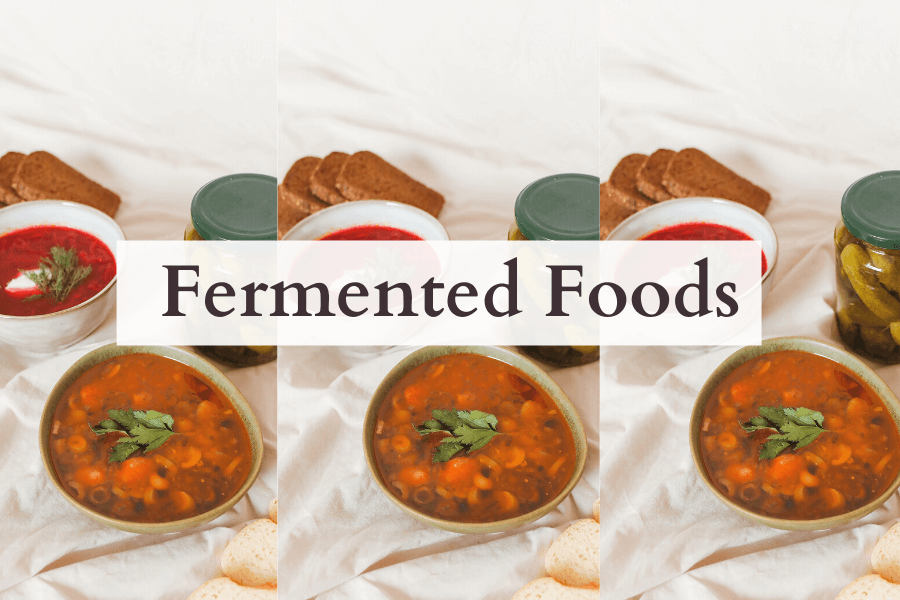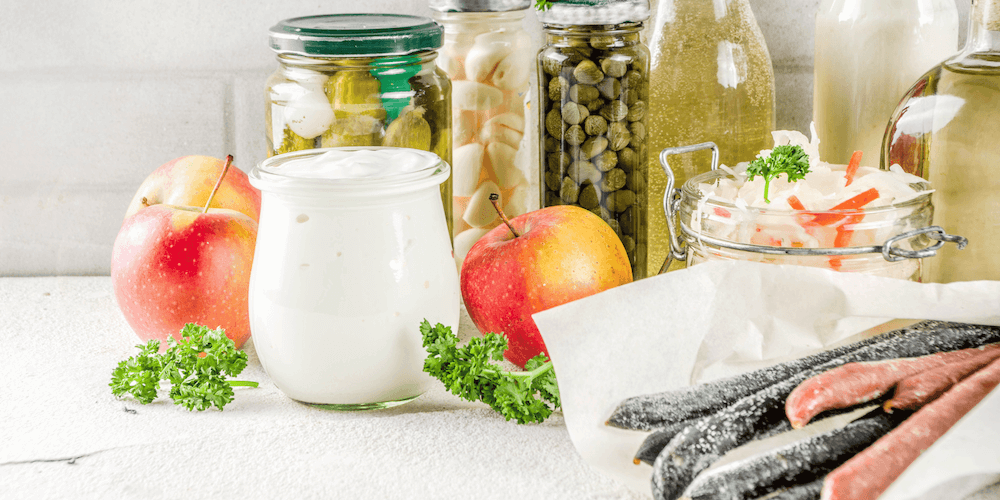One of the best ways to support a healthy gut is to incorporate fermented foods and drinks into your daily diet! We have trillions of bacteria inside of us – most of which are essential, good (probiotics) and they help us to properly digest food.
Fermentation was created to preserve food long-term. It can actually increase the nutritional value of vegetables! The process involves converting carbohydrates/sugar into CO2, alcohol and/or acids. It also gives it the “tanginess” and sourness that many people love. What are the benefits of fermented foods? What are the dangers of fermented foods? Are pickled foods fermented?
Keep reading to learn more!

Note: This article contains affiliate links, meaning In On Around will make a small commission at no additional cost to you. This helps me maintain the site. As always, I value full transparency & only work with brands I love and trust.
What Are The Benefits Of Fermented Foods?
There are many benefits to eating fermented foods! Some benefits include:
- Assists with digestion
- Helps your body better absorb the nutrients provided by food
- Helps your gut fend off any potential pathogens by lowering intestinal pH & preventing the “bad guys” gut-bacteria from attaching to the intestinal lining
- Supports your immune system
- May reduce the risk of colon cancer
Fermented Food & Drinks To Add To Your Diet:
There are many nutritious (and delicious) fermented food options that can be added to your diet, such as:
- Miso
- Tempeh
- Kimchi
- Kombucha
- Sauerkraut
- Fermented Vegetables
- Water or Coconut Kefir
- Sourdough Bread
- Cider
As always, opt for organic whenever possible, as well as ones that specify “live organisms,” “live cultures” or “source of probiotics” (which will mostly be in the refrigerated sections). Fermented products are not usually self-stable. Also, avoid fermented foods with unnecessary artificial flavoring or colors… they’re not needed!
While there are certainly probiotics available in certain dairy products, such as yogurt, dairy can also lead to inflammation in the body. I stick to plant-based sources of fermented foods, many of which are also full of vital vitamins and minerals.
Wine is also a fermented drink, however the alcohol can outweigh thte health benefits.

What’s The Difference Between Pickled And Fermented?
Pickled and fermented foods are very similar, however, they have distinct differences.
- Fermentation is a type of pickling, however not everything that is pickled is fermented.
- Fermentation contains live probiotics, which pickling usually kills off live organisms via heat treatment. Fermented is superior to general pickling!
- The fermentation process uses a brine (like lactic acid), while food that is pickled is usually preserved in a highly acidic liquid like vinegar.
Choose fermented over pickled whenever possible!
Not everything that is pickled is fermented – don’t get the two confused.
The Dangers Of Fermented Foods
It’s important to recognize that some people may not tolerate fermented foods very well because of the high level of probiotics. If you don’t usually eat fermented foods, it’s best to start small and work your way up.
If your gut can’t tolerate fermented foods, it can potentially cause bloating, burping, digestive upset, histamine intolerance, headaches, and more.
Histamine is prevalent in fermented foods and some people can have histamine intolerance symptoms, like a runny nose, hives, nausea, and vomiting. If you have a history of histamine intolerance, it may be best to avoid consuming fermented foods and drinks.
Speak with your doctor (like a naturopathic doctor) before making any major changes in your diet.
As always, listen to your body.
Fermented Foods – Frequently Asked Questions
Click on the below FAQs to learn more about the benefits and dangers of fermented foods!
What's the difference between pickled and fermented?
What are the benefits of fermented foods?
What examples of fermented foods?
What is healthier – pickled or fermented?
How will you incorporate fermented food into your daily life?
Let me know in the comments below!
You can watch our web story here.
xoxo,

Want to read more? Check out my other articles here!
Information on the Dangers of Fermented Foods from: UNC Health Talk, Mother Earth News, Scielo
Copyright In On Around LLC 2021 ©. The statements made on this website have not been evaluated by the FDA (U.S. Food & Drug Administration). They are not intended to diagnose, treat, cure, or prevent any disease. The information provided by this website should not be used as individual medical advice and you should always consult your doctor for individual recommendations and treatment.




2 Responses